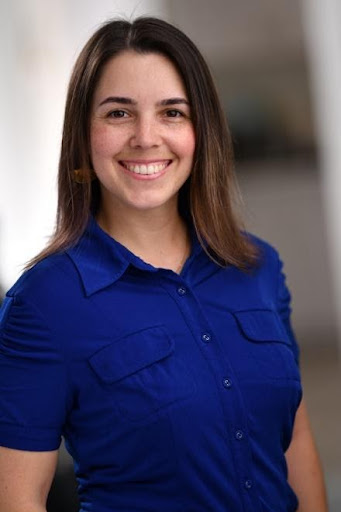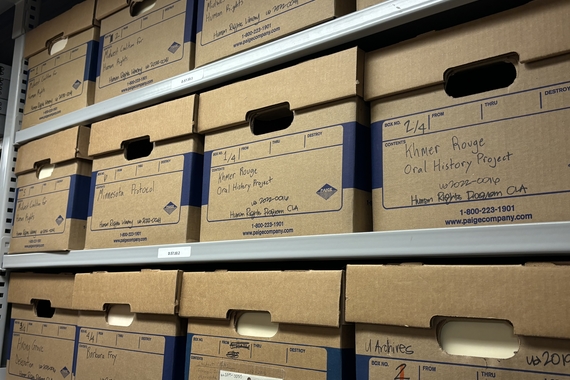The role of development in elevating human rights
The Master of Human Rights Degree Program strongly believes in the importance of integrating professional experience with academic knowledge in the field of human rights, making internships one of the central aspects of the program. Many students, despite challenges posed by the spread of COVID-19 and challenges related to working in the field defending human rights, succeeded in doing amazing work with their host organizations. In this Q&A series, we interview our students to learn more about their experiences. In the fourth Q&A of the series, we are joined by Brenda Urueta, a second-year Master of Human Rights (MHR) student.
Human Rights Program (HRP): Can you tell us more about your educational background, specifically at the University of Minnesota (your program and your area of concentration), and your professional experience? How did both contribute to your decision in choosing this particular internship and the host organization?

Brenda Urueta (BU): I am pursuing my Master of Human Rights degree with a concentration in development. Prior to joining the University of Minnesota’s program through the Humphrey School of Public Affairs and College of Liberal Arts, I worked at a community foundation in northern California for five and a half years in various roles working with the board of directors and executive leadership, as well as in the community. After taking time to reflect on where I wanted my career to go, I began looking into graduate programs in International Studies and Human Rights. When I joined the Master of Human Rights program at the University of Minnesota, it took some time for me to be reminded of my undergraduate studies in international political economy. I decided to study more of the intersection between philanthropy and social impact as it relates to human rights through the lens of development theory and practice.
(HRP): Please describe your summer internship, the host organization, your role in that organization, and the projects you worked on?
(BU): Last summer (2021), I completed an internship with the John D. and Catherine T. MacArthur Foundation as a Social Impact Intern for their affiliate, Lever For Change. Lever For Change’s mission is to accelerate social change and encourage donors and problem solvers alike to think big and leverage investments in effective solutions. My main deliverables were to create a database of their written material – blogs and articles – and to share an analysis with the team and write 2-3 blog posts as well as some research as needed. I finished the database so now they have content at their fingertips and ready to re-use if needed. I also wrote three blog posts with two of them being collaborative. The first one was in partnership with Tinia Montford, who also interned with Lever For Change over summer and we discussed our summer projects. For the second blog, I helped conduct the interview and transcribed/edited the content for a Q&A with Per Scholas, an awardee of the Economic Opportunity Challenge. I also wrote a blog on what it means to lead by learning. I also conducted research by doing a landscape review for the CEO to assess organizations working in a specific location. The experience was positive overall and I am happy to have made great connections with the team there.
(HRP): How did the internship add to your professional experience and personal growth? and how do you see it impacting your career trajectory?
(BU): The internship gave me the opportunity to showcase my adaptability and project management skills. I learned how to review grant proposals and how learning and evaluation happen at an organization that is sort of a start-up. Personally, the internship was such a rewarding experience in that it gave me a chance to rebuild my confidence and self esteem after some workplace experiences that broke me down in years prior. In terms of my career trajectory, I believe that being connected to the MacArthur Foundation is something that I will carry forward whether I work there in the future or not. It solidified my interest in the human rights and development sphere and my curiosity around what role philanthropy can play in promoting and defending human rights.
(HRP): Doing your internship during Covid-19, and working for a new organization can be very challenging. What were the main challenges you faced during your internship on both a personal and a professional level? And how did you overcome them?
(BU): The main challenge I faced was being in Minneapolis while the rest of the team was based in Chicago and being fully remote. It was at times difficult to feel connected with the team and to judge how frequently to check in with my supervisor and others on the team. With that said, the MacArthur Foundation and Lever For Change staff did an amazing job in making me feel welcomed and providing ample opportunities to connect with the team. On a professional level, I felt challenged by understanding the dynamics both between the MacArthur Foundation and Lever For Change but also amongst staff. Being remote makes it difficult to judge responses and dynamics between people, so professionally, that was challenging because I rely on my senses to figure out where I belong on a team. At the beginning of the internship, I was also challenged by my own perceptions of philanthropy. Much like the author and changemaker, Edgar Villanueva, discusses in his book, Decolonizing Wealth, I do think a lot needs to change in the sector. However, I also believe that there are some great things to hold onto. Striking the balance between those things can be tricky but not impossible. I overcame my own negativity by believing in the best in people and being open to being wrong.
(HRP): You experienced the relationship between Human Rights and development in both an academic context at the University and in a professional context during your internship. Can you give us your insights from both experiences?
(BU): I saw a bit of where the disconnect between theory and practice can happen when it comes to human rights and development. Academia has a lot to offer when it comes to understanding the right to development within a legal framework. Even though there is a declaration on the right to development, there is no legally binding instrument to monitor how the right to development is realized. A working group has been put in place to develop a more robust understanding of what is meant by having a right to development. There is debate and contestation around what development is and whether people have a right to it. Furthermore, there is debate around to what end - Is development aimed at improving the material lives of people around the world or ensuring they are incorporated into the globalized economy? Is development more about well-being as some human development theorists have argued? If everyone were materially cared for by standards of the global north, our planet would surpass its limits by far. Of course, those ideas are not mutually exclusive, though the argument could be made for the fact that we do have a system and it is by and large not working for the world’s poor. Furthermore, poverty as a concept itself is socially constructed and therefore requires further examination. To me, one’s well-being is inextricably linked to their ability to have and enjoy their rights to their fullest extent and so I tend to look there versus solely at one’s economic capability though economic capability can be helpful.
When it comes to Lever For Change, they are treading somewhat new territory by empowering organizations to hone their world-changing ideas through the grant-seeking process. They provide a high-touch service by providing applicants with feedback along the way and ensuring proposals that are ready for funding are getting exposure to potential philanthropists and donors. Philanthropic organizations are inherently development organizations. They are often supporting organizations on the front lines of disaster, social justice issues, and human rights struggles. Through my internship, I had first-hand exposure to how this process works and why it can be beneficial in certain contexts. Where I think philanthropic organizations can be dedicating more resources is to the root causes of these social issues – not only researching and talking about it but doing something about it. By that I mean stepping back to see the bigger picture. Because social issues stemming from human rights violations are often co-mingled with political and economic systems, I believe that philanthropists and philanthropic organizations alike – if genuinely concerned about people and planet – should be thinking critically about how things got this way in the first place. Furthermore, there could be more engagement with their small “p” political power. In a capitalist system, money means power, so reflecting on what kind of responsibility they have to shift the dynamics requires some deep digging.
(HRP): What are your recommendations for other students who are interested in pursuing a career that combines both development and human rights?
(BU): Be open to challenging your thinking and perhaps being the only one in the room with a critical analysis of development and human rights. It is an exciting time to be working at the intersection of development and human rights and there are organizations looking for people who have the knowledge and skill to be able to talk about it in practical ways. Talk to your colleagues and professors about your ideas and continue practicing how to connect theory to practice.


